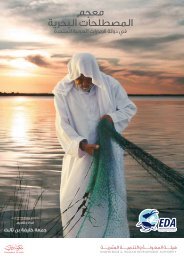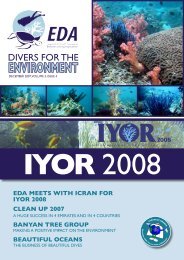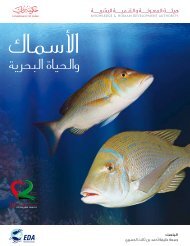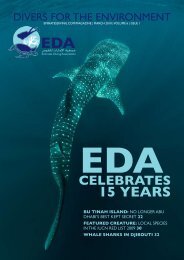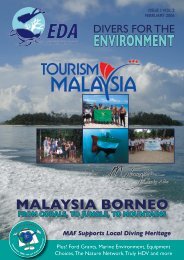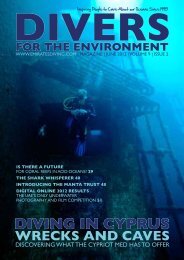Download - Emirates Diving Association
Download - Emirates Diving Association
Download - Emirates Diving Association
You also want an ePaper? Increase the reach of your titles
YUMPU automatically turns print PDFs into web optimized ePapers that Google loves.
FEATURES<br />
Ocean Conservancy’s International Coastal Cleanup<br />
Announced for September 21<br />
Volunteer for the movement for Trash Free Seas and help clean up our coastlines<br />
Feature ocean conservancy photography ally landes – Clean Up arabia 2012<br />
Washington, DC – Today, the Ocean<br />
Conservancy announces the date for the 28 th<br />
annual International Coastal Cleanup, a global<br />
event that mobilizes hundreds of thousands<br />
of people to take action for our ocean, for<br />
September 21. By joining the movement for<br />
Trash Free Seas, volunteers will help clean up<br />
trash already in the ocean and work to reduce<br />
their own trash impact before it happens.<br />
Trash in our ocean is an issue that affects<br />
wildlife, the environment and our economy.<br />
But everyone has a role that they can play in<br />
helping. Here are three actions volunteers can<br />
do to both clean up and prevent ocean trash:<br />
• Take part in this year’s International Coastal<br />
Cleanup as a volunteer.<br />
• Pledge to fight trash: What would happen<br />
if 10,000 people decided not to make<br />
as much trash for one month? We could<br />
reduce the trash on Earth by over a million<br />
pounds. Taking the pledge will help turn the<br />
tide on trash.<br />
• <strong>Download</strong> Rippl, Ocean Conservancy’s<br />
free mobile application that helps people<br />
make simple, sustainable lifestyle choices.<br />
“Last year, volunteers picked up a quantity of<br />
trash equivalent to the weight of 10 jumbo<br />
jets, which demonstrates the more people<br />
who come out, the bigger an impact we can<br />
have,” said Nicholas Mallos, marine debris<br />
specialist of Ocean Conservancy’s Trash Free<br />
Seas program. “Seeing the trash along beaches<br />
and waterways makes you realize: just because<br />
trash is thrown away and out of sight doesn’t<br />
mean it’s out of our ocean. And the continuous<br />
need for the Cleanup indicates we’re not<br />
winning the battle upstream. The Cleanup is<br />
a starting point and just one way people can<br />
help fight the problem of ocean trash.”<br />
The Cleanup is centered on Ocean<br />
Conservancy’s goal of tackling trash at every<br />
point in its lifecycle. While cleaning up trash<br />
that’s already made it to our waterways<br />
is vital, it’s not enough. Through individual<br />
responsibility, innovative science, smart public<br />
policy and industry leadership, we can find<br />
comprehensive solutions to the problem of<br />
ocean trash that will lead to healthier beaches<br />
and a healthier ocean.<br />
“Every piece of trash that is picked up during<br />
the Cleanup should be a challenge for change,”<br />
said Mallos. “The trash that tops our top 10 list<br />
every year – things like cigarette butts, bags<br />
and bottle caps – include disposable plastics<br />
meant for one-time usage. These items simply<br />
do not belong in our natural environment.”<br />
The Cleanup is part of Ocean Conservancy’s<br />
larger strategy for Trash Free Seas and is one<br />
of the many ways the organization is helping<br />
find answers and solutions for marine debris.<br />
Other Ocean Conservancy-led efforts include<br />
supporting a scientific working group at the<br />
world’s leading ecological think tank, The<br />
National Center for Ecological Analysis and<br />
Synthesis (NCEAS), to identify the scope and<br />
impact of marine debris on ocean ecosystems;<br />
building a Trash Free Seas Alliance® of industry,<br />
science and conservation leaders committed<br />
to reduce waste; and launching a mobile app,<br />
Rippl, to help people make sustainable lifestyle<br />
choices that limit their trash impact.<br />
Partners:<br />
The Coca-Cola Company has supported<br />
Ocean Conservancy’s International Coastal<br />
Cleanup for the past 18 years. Last year, Coca-<br />
Cola activated a global employee engagement<br />
campaign to encourage participation in the<br />
Cleanup. Over 24,000 Coca-Cola system<br />
associates, their friends and families in 27<br />
countries volunteered, cleaning more than 1,300<br />
miles of coastline. As part of its commitment to<br />
address global climate change, Bank of America<br />
has supported the Cleanup since 2002, with<br />
thousands of employees participating in<br />
Cleanup events all around the world. Other<br />
national sponsors include National Oceanic<br />
and Atmospheric Administration, Altria Group,<br />
Inc., The Dow Chemical Company, Landshark<br />
Lager, Glad, Brunswick Public Foundation,<br />
CVS Caremark, Johnson & Johnson Family of<br />
Consumer Companies and US Environmental<br />
Protection Agency.<br />
The 2012 International Coastal Cleanup, by<br />
the numbers:<br />
Total:<br />
• More than 550,000 people (561,633)<br />
picked up more than 10 million pounds<br />
of trash (10,149,988) along nearly 20,000<br />
miles of coastlines (17,719)<br />
• Over the past 27 years, over 9.5 million<br />
(9,654,895) volunteers have removed 163<br />
million (163,940,906) pounds of trash from<br />
more than 330,000 (330,009) miles of<br />
coastline and waterways in 153 countries<br />
and locations.<br />
Volunteers found:<br />
• Total garbage equal to the weight 10<br />
Boeing 747 jumbo jets<br />
• Enough trash to equal the weight of 41<br />
blue whales<br />
• Enough beverage bottles that, when stacked<br />
end-to-end, are equal to: 1,000 Empire State<br />
Buildings, 2,408 Space Needles or 1,368<br />
Eiffel Towers<br />
• Enough disposable cigarette lighters to<br />
start 178,557,500 campfires<br />
In the past 27 years of cleanups,<br />
volunteers found:<br />
• 57 million cigarettes butts, which, if stacked<br />
vertically, would be as tall as 3,867 Empire<br />
State Buildings.<br />
• Enough glass and plastic bottles to provide<br />
every resident of New York City, Los<br />
Angeles, Chicago, Houston, Philadelphia<br />
and Phoenix a cold beverage on a hot<br />
summer day.<br />
• Almost 10 million plastic bags (9,806,905),<br />
which required 1,176 barrels of oil to produce.<br />
• More than 1 million (1,017,444) diapers –<br />
enough to put one on every child born in<br />
Japan last year.<br />
• Enough cups, plates, forks, knives and spoons<br />
to host a picnic for 2.3 million people.<br />
Ocean Conservancy educates and empowers<br />
citizens to take action on behalf of the ocean.<br />
From the Arctic to the Gulf of Mexico to the<br />
halls of Congress, Ocean Conservancy brings<br />
people together to find solutions for our water<br />
planet. Informed by science, our work guides<br />
policy and engages people in protecting the<br />
ocean and its wildlife for future generations.<br />
Why is ocean trash a problem we<br />
need to address?<br />
It’s a threat to our economies: Coastal<br />
municipalities spend hundreds of millions of<br />
dollars every year on daily beach cleanups to<br />
prevent trash from reaching the water, while<br />
recreational boaters and the commercial<br />
shipping and fishing industries face significantly<br />
higher costs from debris in the ocean.<br />
It’s a threat to wildlife and habitat: Ocean<br />
trash can entrap and strangle ocean wildlife,<br />
many of which are listed as threatened or<br />
endangered. Also, if animals eat ocean trash,<br />
they can absorb high concentrations of toxins.<br />
This has been seen in both seabirds and sea<br />
turtles, where higher levels of contaminants<br />
have been found in the blood of animals that<br />
had ingested plastic particles. Ocean trash is<br />
also a threat to ecologically critical yet sensitive<br />
marine habitat.<br />
It’s a threat to our health and food safety:<br />
Toxic chemicals are transferred up the food<br />
chain as large ocean predators – many of which<br />
we eat – accumulate toxins eaten or absorbed<br />
by smaller fish and plants. The concentration<br />
of toxins in these predators, such as tuna and<br />
mahi-mahi, increase considerably as they move<br />
up the food chain.<br />
Trash jeopardizes the health of the ocean,<br />
coastline, economy and people. It’s in our<br />
ocean and waterways and on our beaches<br />
– and is here to stay unless we change our<br />
practices. Trash is one of the biggest threats<br />
to the health of our ocean and waterways.<br />
For 28 years, we have watched as trash has<br />
threatened ocean wildlife and ecosystems, and<br />
undermined tourism and economic activity.<br />
• In last year’s Cleanup, over 550,000 people<br />
(561,633) picked up more than 10 million<br />
pounds of trash (10,149,988) along nearly<br />
20,000 miles of coastlines (17,719).<br />
• Future generations will be the ones dealing<br />
with our trash. We think this can and will<br />
look different in the future. By working<br />
together to find solutions, we will take<br />
significant steps forward in understanding<br />
and preventing ocean trash.<br />
• Estimated time it takes for these products<br />
to decompose:<br />
Fishing Line: 600 years<br />
Plastic Bottles: 450 years<br />
Aluminum Cans: 200 years<br />
Plastic Bags: 1-20 years<br />
The ocean isn’t the only location impacted.<br />
Trash affects all waterways, coastal or inland,<br />
and threatens the well-being of communities<br />
that depend on them. In 2012, Pennsylvania<br />
Cleanup volunteers collected the greatest<br />
amount of debris, with each volunteer hauling<br />
approximately 90 pounds of trash from lakes,<br />
riverbeds, creeks and streams.<br />
What you use, eat and drink in your everyday<br />
life could end up in the ocean. Every year our<br />
Top 10 list includes items such as cigarettes,<br />
utensils and beverage containers – trash<br />
that comes from our everyday lives and<br />
households. These items are not only unnatural<br />
to the ocean, but are dangerous to the wildlife<br />
that relies on the ecosystem. The ocean truly<br />
is always downstream.<br />
Ocean Conservancy is tackling trash at every<br />
point in the lifecycle to create healthier beaches<br />
and oceans to benefit the environment and<br />
26 DIVERS FOR THE ENVIRONMENT, SEPTEMBER 2013<br />
SEPTEMBER 2013, DIVERS FOR THE ENVIRONMENT 27




